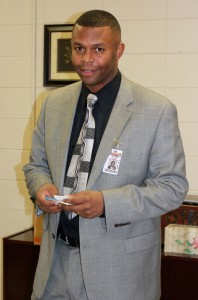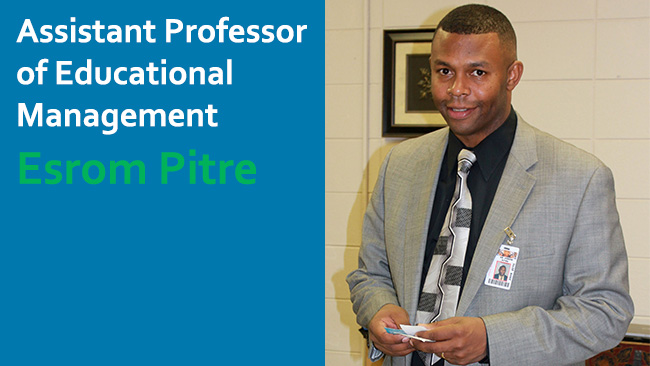UHCL prof put educational leadership principles to the test

HOUSTON (March 5, 2014) — University of Houston-Clear Lake School of Education Assistant Professor of Educational Management Esrom Pitre has done more than just teach the principles of educational leadership, he has actually practiced them. Prior to joining the UH-Clear Lake faculty in fall 2013, Pitre successfully took on the challenge of transforming a low performing Louisiana high school into a model of academic change and success.
Pitre, the newest member of UHCL’s educational leadership team, was teaching at a university in Denver, Col. when his wife’s new job at a university in Louisiana required the family to relocate. The professor saw the move as an opportunity to prove that the culturally responsive leadership principles he had been teaching were more than ivory tower theory.
A little more than 60 miles from New Orleans, Donaldsonville High School was experiencing low morale on top of years of low performance says Pitre. Rated an F school for eight consecutive years, Pitre adds that it had been placed on the academic watch list and was on the verge of being taken over by the State. He explains that the graduation rate at the school was a low 67 percent and that the school culture was one where the students weren’t motivated to learn and showed no respect to teachers, with teachers encountering discipline and attendance problems. Pitre says that drugs and weapons were often found on campus, and student fights were a daily occurrence.
“The students didn’t produce because they didn’t care,” Pitre says. “Nobody at the school wanted to be there – not the teachers, the students, or the administrators.”
Recruiting a few teachers who believed as he did, that they could make a difference, Pitre launched a three-prong program to engage the students, the teachers, and the community.
Addressing the incoming freshman class he told them, “We’re going to change the culture at Donaldsonville High School. As seniors you all are going to make history and become known nationally for transforming our school into a highly successful school.”
Working diligently with all the stakeholders, including area ministers and business owners, Pitre says the school began to transform. Over the next four years it raised its rating to a B, its graduation rate to 87 percent, and it made the top of the list in gains of academic improvement in the state in 2013.
“I was proud of the way that we took that school and changed the minds of the kids from really not believing in education to having some hope, really trying hard and believing that they could be as successful as they wanted to be in reaching their dreams,” says Pitre.
He says the transformation resulted from a variety of actions.
“The biggest thing for me was paying attention to the difference between how the school should be from the teachers’ standpoint and the community’s, and then also the students total disconnect. It was trying to connect all the pieces.”
The teachers wanted to improve the curriculum and to make sure that the students were constantly engaged in learning in a way that they could retain what they learned, Pitre explains. So the teachers focused on culturally responsive teaching, utilizing structures that required the kids to talk and work together in groups and to communicate.
He believed that on the students’ side, the biggest thing was the need for inspiration.
“We needed people to inspire them to believe that they could do more than they ever thought they could. I had to get teachers that felt like they could inspire students to believe in themselves.”
Lastly, he engaged the community in a way that it had never been engaged before. This included hosting “preachers versus teachers” game nights. They brought the ministers into the games, let them walk the halls, and made them feel they were a part of the school. In return, Pitre says, the community was willing to help in any way that he asked them to help without question.
Pitre also opened the school’s doors to other administrators from across the state who wanted to see what Donaldsonville High was doing to foster its remarkable transformation. His willingness to share the techniques earned him the 2013 National Institute of Excellence in Teaching’s TAPTM Ambassador Award. TAPTM is NIET’s System for Teacher and Student Advancement, which has raising student achievement as its ultimate goal. The goal is accomplished by creating incentives and support structures that will maximize teacher effectiveness such as the work done by Pitre at Donaldsonville High School.
Leaving Donaldsonville was one of the hardest decisions that he had to make, but he says, “Where I was able to help this one school, I’m hoping now that I can have an impact on more schools nationally. So I’m thankful for the opportunity to be at the University of Houston-Clear Lake. I’m excited about helping out and maybe working with one or two schools to help them reach the goals that they set.”
For more information about UHCL’s School of Education and the educational leadership program, visit http://soe.uhcl.edu, email education@uhcl.edu or call 281-283-3615

